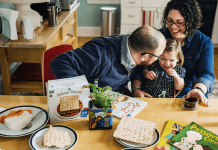My husband and I have walked into my late mother-in-law’s house for the last time.
We are in the process of settling her estate, including the sale of her house and disposition of everything in it.
From a hutch filled with china and crystal goblets to overflowing jewelry boxes and coin collections. And everything in between.
A lot in between.
Her clothes. The Notre Dame sweaters my late father-in-law was so fond of wearing. Her furniture. Furniture inherited from her mother-in-law, still in the same place in the garage where it was originally placed 30 some-odd years ago. My husband’s Cub Scout uniform. Christmas decorations. Lots and lots of Christmas decorations.
Every room, every closet, every shelf, every drawer. Full of stuff. A lifetime of stuff. Two lifetimes, if you count my father-in-law, who passed away 11 years ago.
What to Do With a Lifetime of Stuff
My mother-in-law was a neat and tidy housekeeper. But like many of us (myself included), she lived in a good-sized house with plenty of room to accommodate stuff. Things inherited from her parents and her in-laws. The broken vacuum cleaner waiting for repair in the back of the closet. Hundreds of books read once. You get the picture.
And the cost of disposing of all of that stuff? Having the estate sale company we hired go through every room, every closet, every drawer, separating the trash from the treasures, may cost more than will be generated at the eventual estate sale.
Her house has been transformed into a store, the estate sale company having cleverly arranged and displayed my mother-in-law’s possessions on tables in every room.
All of her possessions with any value, save the very few we kept, each with a tiny white price tag.
Losing your last surviving parent is hard enough. But being the arbiter of which of your parents’ and grandparents’ treasures get saved and which end up sold, donated, or in a landfill? gut-wrenching.
The lesson we have learned from this experience?
Most of the stuff in your house is worthless. And eventually, someone, either you or your kids, will be tasked with the overwhelming job of getting rid of it.
Most of Your Stuff Is Worthless
Most of the stuff in your house is worthless.
Yes, even the stuff you worry the most about, the stuff you think is so good you don’t use it for fear of breaking it, has little to no resale value.
From china, china cabinets, crystal goblets, silver tea sets, pianos, and collectible figurines like Hummels, to grandfather clocks and real pieces of craftsmanship furniture.
Why? Baby boomers have glutted the market with their castoffs, and millennials, the next generation of buyers, don’t want it.
Millennials hate both formal in-home entertaining and use of second-hand goods. With looming student loans, they tend to rent and move often. Who wants to be constantly moving a piano and a grandfather clock from apartment to apartment?
And furniture? There’s no market for so-called “brown furniture,” meaning any furniture (regardless of quality) other than the “mid-century casual” furniture (think clean, lightweight) favored by millennials. Brown furniture is basically firewood.
If it’s not in great condition, it’s also not fit for donation because it can’t be resold.
All of my mother-in-law’s furniture (including the pieces inherited from her mother-in-law and kept for decades)? Straight to the landfill.
Well, Almost Everything…
What do guns, LPs (records), and precious metals/gems have in common?
They are 3 things you might have in your house with a robust resale value.
Silverware also has value, but only if it is real silver and can be melted down.
3 Things You Should Be Doing NOW to Reduce the Amount of Stuff You Have
1. Be viciously thoughtful about holding onto sentimental items.
Here was our goal with sorting through my mother-in-law’s things. Keep just enough to remind us of her, but not so much stuff that our daughters are going to be dealing with it 40 some-odd years from now.
Here’s what we kept:
- A painting to be displayed in our dining room
- My mother-in-law’s treasured Swarovski crystal animal collection (all of which were given to her by her children and grandchildren over the years)
- Jewelry to be divided among the granddaughters
- Each of our daughters got to select 1 item
And that was it.
Well, almost. We did set aside photos to be digitized (with the originals then destroyed).
Was it hard leaving everything else? You bet it was. But we don’t want to be dealing with a lot of stuff years from now (or worse, leaving it to our daughters to deal with).
I try to be viciously thoughtful with my own sentimental items. For example, I don’t save any school papers or art projects from my kids (though I do take photos of my favorites).
2. Buy fewer books.
While used book resellers like Half Price Books do an important service in keeping books in circulation, a surprising number of books end up in landfills because many paper recycling facilities can’t process the the glue that binds book spines.
My resolution last year was to cut down on my book consumption by only reading books that I borrow from the library or purchase on my Kindle e-reader. If you haven’t used a library in years, now is the time to go back. My local library has an app where you can “order” books online, and pick them up the next day on a special “hold” shelf strategically placed next to the check-out kiosk.
How successful was I on my resolution? I read 1 to 2 books a week in 2019, only 1 of which was a hard copy purchased from Amazon.
3. Buy fewer, but better quality, clothes
The world is overflowing with used clothing.
We buy substantially more clothing over our lifetimes than our grandparents did.
Clothing made today is meant to last no more than a few years. In fact, a lot of clothing isn’t even made to withstand more than a few washes.
Think you are “paying it forward” but dropping off a load of unwanted clothes at Goodwill? Think again. Most clothing donations never make it to the racks at Goodwill and only about a third of what does eventually sells.
To really pay it forward, cut down on the amount of clothing you have by buying better quality clothes that last longer.
Keeping What Really Matters
My 5-year-old chose to keep a Christmas music box from her Grandma’s house. It plays “White Christmas” and has tiny ice skaters going around a rink inside. Each Christmas, my mother-in-law would bring out this music box and let each of her granddaughter’s play with it. It’s value in preserving a precious memory of Grandma? Priceless.














What a great article, I am sure it is going to change my life for the better. My parents were auction addicts in the 60’s – 70’s and I became one too. What a nightmare when they moved from the century home on the farm to a smaller house in town! Then when Dad passed I inherited all their ‘stuff’. No one wants antiques these days but I haven’t been able get over the prices they were worth back in the day and they, along with my own collecting has worried me, I know if I don’t do something now, they will all end up in a dumpster. Reading your article has brought me to realize how all this ‘stuff’ has held me back from enjoying life, thank you for showing me the way <3
Well if you’re worried about your antiques, donate them to a museum, I guess people would love to see your treasures, because I know I would ?
Very good article. I’m going through things now if my mothers that passed away 3 yrs ago. She still had stuff saved from my grandmother’s. And the dishes 3 or 4 different sets. I dont know what to do with.
When my Grandma broke her hip, her sons and daughter decided to auction everything off. Much to their chagrin when the doctor said she could return home after 30 days of rehab :(. They asked each grandchild to pick one item to keep. My cousins grabbed furniture or something antique. I wanted her teapot. A ceramic white teapot with a handpainted English maiden sculpted on the front. It was worn, the bottom was rough from the decades of use, the inside stained from the tea she made every day and served to her family, guests and husband. It sits on top of my fridge now, and every single time I use it, or even look at it, I’m transported back to the child who loved seeing that teapot on her counter. Priceless.
If I had the will, I would create a non-profit that brokers gifts of unwanted household items to any of the following groups:
• homeless people who have finally found a home, however modest
• prisoners just out of jail
• refugees who have just found a place to stay.
All three groups have literally no possessions. They need everything—furniture, linens, clothing, shoes, pots, pans, silverware, supplies of all sorts.
What a shame that people who are over-burdened with these things end up putting them in a landfill.
After! Waste not, want not!
I’m not getting rid of my things because I still enjoy every bit of my junk!!!
Depending on where you live, you can find charities that provide these donated items to those groups mentioned above. I donate to a charity called “Hour Children” and what they can’t sell to raise money, they donate to women just out of jail and their children. I used to donate to a women’s shelter but I misplaced the information years ago and for obvious reasons, they are not listed.
There are many churches that will do just what you describe. The social needs ministry at our church will take any household item in good condition and give it to those less fortunate.
Excellent response! Hopefully more people will think this way and your comment will end up helping so many!
Those are beautiful ideas.. I have never thought of that before! Those who have nothing would surely be grateful for anything.. ?☺
That is a great idea. Something to seriously consider starting wherever you are.
There may be organizations near you that do what you suggest. I am in Cary NC and donate items to one. Search around for refugee assistance groups.
Its the labor, transport , and storage that makes it too costly.
Oh wow, brilliant idea. I have in the past set up apartments with stuff from my home for ladies coming out of prison and starting over. It’s very rewarding. Thank you for the suggestion of refugees.
I understand decluttering, and most people should do more of it, but PLEASE don’t throw a house full of stuff into the landfill! To me that is the worst kind of wasteful! There are plenty of people out there who benefit from your discarded household items. And there are many of us who are talented enough to fix broken furniture and transform brown furniture. Many of those old things that were your mother’s or grandmother’s may not have huge monetary value, but they are still useful and loved by many. By all means, declutter your life, but donate all you can to others who may be able to use or transform it.
Thank you so much for your article. You described everything to a T. After my Mother’s passing last year this task was daunting for the whole family.So much so that all of us have vowed to never buy another thing. I use to kid my Mom about making decisions before she passed.I told her that King Tut was the only one that took his stuff with him.But time passes, and we accumulate more stuff.My Mother had beautiful things that had to be sold for almost nothing.All the exact same things you mention in your article.I miss my Mother but I don’t miss any of her things.Thank you for your article.
I am one of the family historians for our family. I am happy that my three adult children are glad to inherit our family heirlooms from generations past. I try to impart how special my own grandparents were who owned some of these items. My parents recorded stories of THEIR grandparents who owned a few things, and so on. Fortunately, we have lots of neices and nephews to spread those ancestral goods around. If one doesn’t want it, another will. The everyday common things — don’t care so much what happens to them. It’s just stuff. In the end for me at least, the physical articles that our ancestors are touchstones to remind us of these special people who helped shape our lives by sharing their love.
❤️
I am a member of a local civic club and we have an annual “White Elephant Sale”. This is used as a fund raiser. We sell gently used items, which consist of items that you mention. Members bring items and we have had items donated, some very expensive, from people that are downsizing, some items salvaged from estate sale. The items are sold by silent auction or auction. The fund are the donated to the agencies supported by the club. Very profitable and well used. Christmas Decorations (gently used) are sold the Sat after Thanksgiving. This too is a great fund raiser and items that are left over and given to a women and children half way house. Just some suggestions!!
Thank you for the wonderful article and insight. When my parents passed, there were six of us kids to sort through the stuff. (Still a daunting task!) our daughter issn only child and I DO NOT want to put her and her amazing husband through the arduous task of getting rid of things. She has already shared what has meaning to her and we’ll save that (plus maybe a couple of items for future grandchildren, if there are any. I am determined to declutter NOW…for the benefit of all of us.
This article is very informative, but you have to realize what era your parents and grandparents lived in. It may not seem important to their family, but those individuals lived in a time, that family, and everything associated with it, was worth saving. Millenials today have no sentiments to “things.” Everything is meant to be disposable, so they save nothing. So don’t criticize your loved ones for having too much stuff. Just know that at some time in their lives those things made them happy. I have tried to take steps to help my children in the process, by putting things in special cabinets, labeled with dates, what they are, and if they could be worth anything. Hard to put values on 46 years of sentimental things.